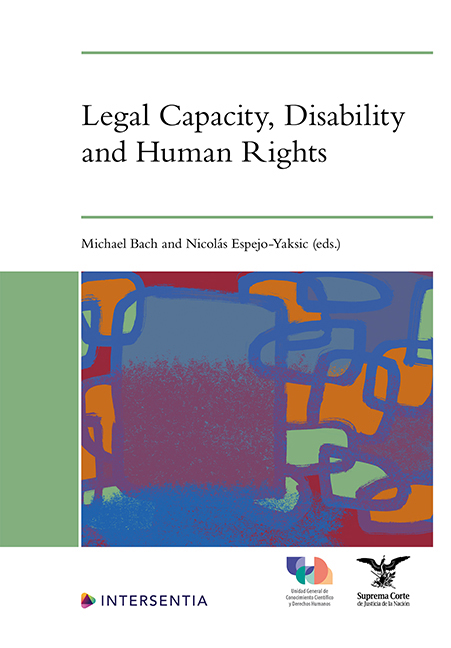Book contents
- Frontmatter
- Foreword
- Acknowledgements
- Contents
- List of Cases
- List of Contributors
- Legal Capacity, Disability and Human Rights: Introduction
- PART I HISTORICAL PERSPECTIVES AND THEORETICAL FRAMES
- PART II LAW REFORM: COUNTRY AND REGIONAL PERSPECTIVES
- PART III LEGAL QUESTIONS, PERSISTENT CHALLENGES
- Index
- About the Editors
Legal Capacity in China’s Mainland
Published online by Cambridge University Press: 03 April 2024
- Frontmatter
- Foreword
- Acknowledgements
- Contents
- List of Cases
- List of Contributors
- Legal Capacity, Disability and Human Rights: Introduction
- PART I HISTORICAL PERSPECTIVES AND THEORETICAL FRAMES
- PART II LAW REFORM: COUNTRY AND REGIONAL PERSPECTIVES
- PART III LEGAL QUESTIONS, PERSISTENT CHALLENGES
- Index
- About the Editors
Summary
INTRODUCTION
This chapter reviews the normative framework of legal capacity in China‘s mainland. The primary focus includes China‘s adult guardianship system in the recently adopted Civil Code and the provisions from the first national Mental health Law (MHL) that authorise detention and involuntary treatment. This chapter defines legal capacity, the equal recognition of which is central to the spirit of the United Nations Convention on the Rights of Persons with Disabilities (CRPD or Convention), as boThthe capacity for having rights and the capacity for exercising rights. In China, as elsewhere, legal capacity, particularly the legal capacity of persons with intellectual disabilities and psychosocial disabilities, is denied through provisions for adult guardianship and the application of involuntary admission and treatment under Chinese non-criminal law. Following the adoption of the CRPD, the normative framework governing legal capacity has been subject to law reform, through which the respect for the autonomy of persons concerned has been strengthened. The chapter will outline the key points of this normative framework, with a view to highlighting the changes brought by the law reforms. It will also raise questions about the extent to which these changes have been translated into practice.
Before proceeding to a closer examination of the law regulating the exercise of legal capacity in China's mainland, we outline the approach that gives effect to CRPD Article 12 on legal capacity in this jurisdiction. Sections that follow discuss the law reforms related to the adult guardianship system in the Civil Code and the Mental health Law respectively. We conclude with a discussion on the implementation of such law reforms.
STATUS OF THE CONVENTION AT DOMESTIC LEVEL IN CHINA's MAINLAND
It is difficult to define whether the Chinese legal system, like most domestic legal systems, follows the theory of monism or dualism; therefore, the status of international treaties in the Chinese legal system is a very complex issue. There is not an explicit rule that prescribes the status, hierarchy, or effect of Article 12 in Chinese law. Before the ratification of the CRPD, China has been a party to all the core human rights conventions except for the International Covenant on Civil and Political Rights, which has not been ratified.
- Type
- Chapter
- Information
- Legal Capacity, Disability and Human Rights , pp. 237 - 254Publisher: IntersentiaPrint publication year: 2023



